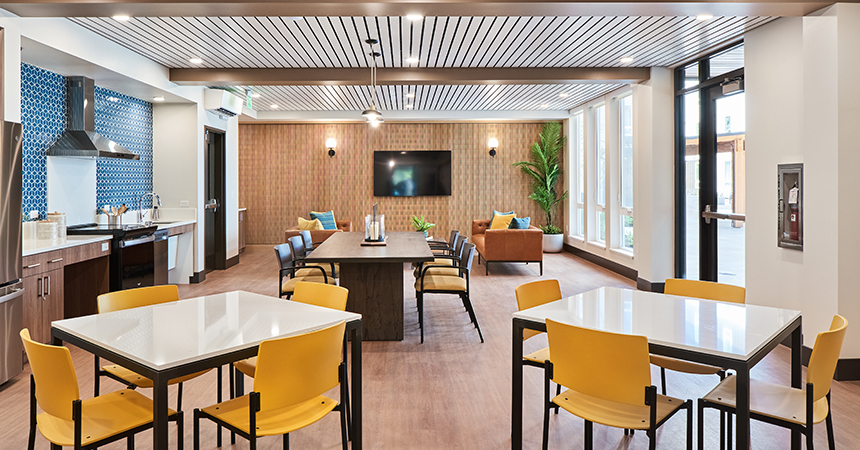If a power outage occurs in the Powelhurst-Gilbert neighborhood of Southeast Portland, residents of Crescent Court Apartments know they have a haven in their shared multipurpose community room. The lights will be on, residents can charge their phones or laptops, and someone might even plug in a Crock-Pot to share a warm meal. It’s all part of a thoughtful, energy-efficient design that includes solar panels and battery storage backup.
Developed by Related Northwest in partnership with Central City Concern, Crescent Court Apartments opened in 2022. The 138-unit affordable apartment community offers housing for families with low or very low incomes (30 to 60% of the area median income), with seven units designated as Permanent Supportive Housing for individuals who are homeless or at risk of homelessness.
Related Northwest intentionally collaborated with several nonprofit service providers on the project. Central City Concern offers intensive onsite services including mental health care. The Boys & Girls Clubs of Portland operates a club inside the building and provides free after-school enrichment activities for school-aged residents. In addition, the Immigrant Refugee Community Organization (IRCO) provides immigrant and refugee family outreach to the diverse community.
“Providing Crescent Court residents with wrap-around services is integral to the health and well-being of our residents,” said Ryan Hood, Assistant Vice President, Development, for Related Northwest.
A commitment to green building is another factor that’s helping the community thrive. Energy Trust solar trade ally Imagine Energy installed a 161.04-kilowatt on-site solar array, covered in part by Energy Trust incentives. The array generates nearly 176,000 kilowatt-hours of clean renewable power annually, which saves over $25,000 on electricity costs every year.
“Our goal is to incorporate solar on all of our developments. The long-term savings offset the costs of the installation, which provides us with the money to build more units and to increase affordability,” said Hood. “The solar offsets the power for the Boys & Girls Club, our community room and other common areas. Going solar gives us the flexibility to stretch the budget a bit further.”
The solar panels are also connected to a battery storage system that provides backup power for lighting and electrical outlets in the community room. This multipurpose room is a daily gathering space for birthday parties, family celebrations, language classes and even public safety events. “During an outage, the room remains powered to create a place of respite and comfort for residents,” said Hood. “Because our region has experienced severe winter storms and wildfires in recent years that can interrupt power, the residents are grateful for this space.”
The solar array recharges the battery daily, so even during extended outages the community room will have clean, safe, quiet backup power.
Many energy-efficiency measures add to the building’s green profile and help control energy costs. Energy Trust cash incentives helped cover investments in a high-performance building envelope, upgraded HVAC system, Energy Star appliances, LED lighting and gas condensing water heaters. These measures save approximately 325,000 kWh and 3,900 therms annually, and will contribute to significant utility cost savings.
“Reducing utility expenses for this development allows for deeper affordability and less dependence on public resources,” said Hood. “Ultimately, designing and building green-focused housing communities is critical to creating thriving neighborhoods and improving our city.”
More cash incentives available
To help more businesses incorporate solar + battery storage, Energy Trust recently introduced battery storage incentives of up to $15,000 that can be combined with solar incentives, which also extend up to $15,000. Tribes, nonprofits and affordable multifamily housing projects may qualify for increased solar incentives.
If you’d like to learn more about how solar + storage can help your organization control energy costs for years to come and have backup power, contact Energy Trust to request a no-cost custom analysis and bid.

